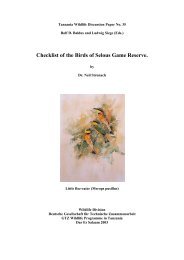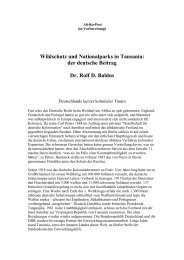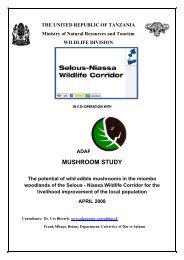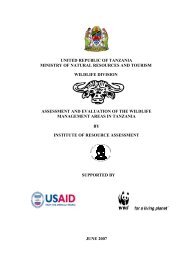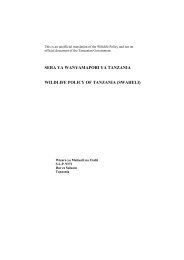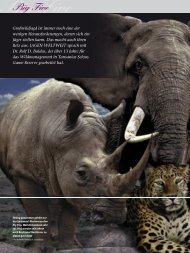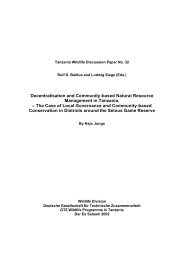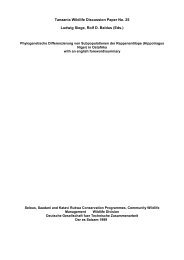African Indaba Articles - wildlife-baldus.com
African Indaba Articles - wildlife-baldus.com
African Indaba Articles - wildlife-baldus.com
You also want an ePaper? Increase the reach of your titles
YUMPU automatically turns print PDFs into web optimized ePapers that Google loves.
guide them in the hunt as best he possibly can, in accordance with his, the professional hunters, valuesystem.The DilemmaAnd this is where the professional hunter’s dilemma arises. What should be the guiding principles uponwhich his value system is based?Great strides have been made in nature conservation in Southern Africa in recent decades. Scientific,social and economic principles have been applied to the benefit of wild life and the environment. Increasing<strong>wildlife</strong> numbers have been widely, but not universally, matched by improved trophy quality. Successes inhabitat restoration, the rebirth of biodiversity in previously devastated areas and the reintroduction andconservation of <strong>wildlife</strong> should be honored and respected by every professional hunter. That respect shouldunderpin his value system.A genuine, informed and applied concern for the well being of the <strong>wildlife</strong> in his hunting area will,therefore, be a good starting point. Over time it will make a difference. It will make a difference to <strong>wildlife</strong>, theenvironment, to the clients’ respect for him as a person and for the profession in which he operates. Butdoes the professional hunter have the luxury of time?A soundly based ethical code of hunting is an essential further element of the professional hunter’s valuesystem. But does he have the strength of character to impose it on a strong willed client with his own,perhaps very different, hunting ethic and ambition?In their heart of hearts, most professional hunters know what it is that should form the basis of their valuesystems. But the pressures of the modern world intrude on all aspects of life. The influence of thesepressures in the hunting field can and does lead to corruption. Competition among peers and the desire tosee their names in the record book are real temptations to professional hunters too.There is widespread concern that in many parts of the world the record books are <strong>com</strong>promising much ofwhat hunting is all about. <strong>African</strong> hunting – with its wide variety of species – is particularly affected. Therecord books and award programs have turned an individualistic pastime into an occasionally fierce<strong>com</strong>petition. Fair chase, hunting traditions and sound conservation principles often fall by the wayside.Far too many visiting hunters have only limited time available and yet they want to hunt a long “shoppinglist of trophy animals”. And many hunters want record trophies – in the “top ten”, wherever possible. Theseexpectations are simply unrealistic, but they put the professional hunter under extreme pressure. Importantlytoo, it’s the professional hunter’s reputation, which is at stake. What does he do, if the visiting hunter'sobjectives are nothing short of high scoring record trophies and if the client insists on unfair chase methodsto achieve his goals? If he disregards the client’s wishes, an unfavorable hunt report may be the result. Andunfavorable news travel fast in the hunting world. Is it reasonable to expect a professional hunter or outfitterto put his business success at stake?For an outfitter and professional hunter, the economic dilemma is augmented by the enormous marketpower vested into the record books by international hunting associations. Professional hunting associationsand individual professional hunters have been critical of the present recording and award procedures and itssystem-immanent abuses. Unfortunately, the hunting associations have not to date addressed the issues onan internationally coordinated, industry wide basis.There is only one way to change this situation – hunting associations must look for a solution whichadequately considers the interests of all, and importantly also those of biodiversity conservation. Sustainabletrophy hunting requires that game populations be managed according to biological principles – and not thosedictated by the figures of a scoring system. Killing a high scoring, yet immature buffalo bull has seriousimplications on sustainability. This applies not only to buffalo, but to all game in general.Last but not least a word about hunting ethics. It is generally said that ethics are valid in the eye of thebeholder only. What is ethically acceptable hunting practice in one culture or on one continent maybe unethical in another. But let us not forget that hunting ethics are the result of thousands of years ofhunting traditions – they change and evolve with the times, but one thing is for sure, their origin and purposeis in one key factor called sustainability.133



